News
Jaffna: A story of changing realities
“If I had a world of my own, everything would be nonsense. Nothing would be what it is because everything would be what it isn’t.”
– “Alice in Wonderland”, Lewis Carroll
The women on Jaffna’s streets carry themselves differently from the young women of the south. Their shoulders are back and their chins lifted and they look you calmly in the eye; there’s none of the Princess Diana-like sideways coyness. They outnumber young men – in many places there are far more women than men astride scooters and bicycles.
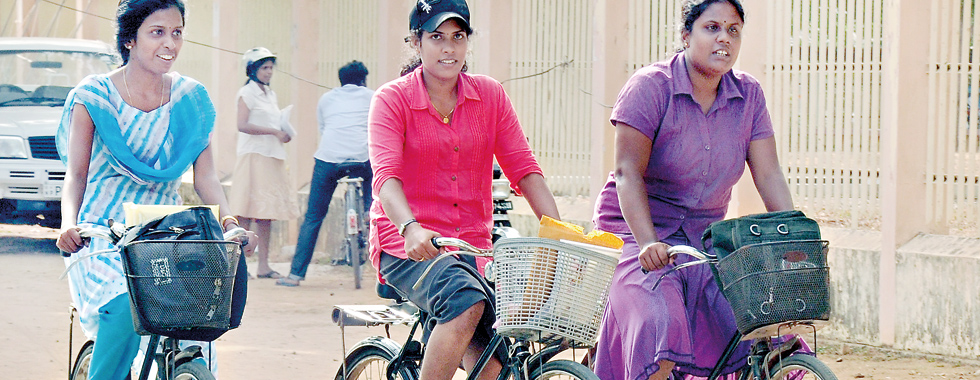
Riding into the future: Wherever you look there are far more women than men astride scooters and bicycles. Pix by Hasitha Kulasekera
“The young people are very few in Jaffna,” says Ponnuthurai Balasundarampillai, Professor Emeritus at Jaffna University and member of the National Language Council. “The young men have died or gone away. You see young girls everywhere usually, no?”
Women could be the educated elite of the future in Jaffna. In Biology, Bio-Science and the Arts the ratio of female to male students is 80-20, says Professor Balasundarampillai. At the Ramanathan College of Fine Arts almost all the students are female; in Medicine, males are ahead only by a whisker: 52:48, and only in Physical Sciences are males in a clear majority: 65:35.
If young people – particularly women – were to vote in the forthcoming Northern Provincial elections the results could be interesting.
But the strong visible showing of women in Jaffna, like many other factors, is deceptive. Jaffna’s establishment, leaning on its conservative, hierarchical past, will dominate the vote while most of the youth stay passive. “The older generation controls the voting decisions of the young,” says the LTTE’s former spokesman, Daya Master, a prospective United People’s Freedom Alliance (UPFA) candidate. “The elderly people think the TNA (Tamil National Alliance) will solve their problems.”
Is the election going to be about provincial-controlled land and police powers or jobs, Tamil pride or centrally-funded development, chucking the military out or security from renewed conflict, a return to the status quo ante Prabhakaran of caste and male-dominated life or one free of such constraints?
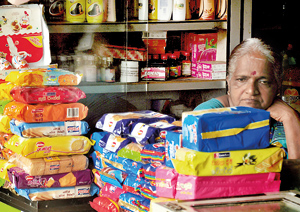
For the older generation the issue of land is important
The young men see visions while the old dream dreams of a comforting conservative past; the youth have their eyes set on a future they can literally bank on. But they are alienated from the political process. As happened in China after the excitement and trauma of the Tienanmen Square uprising, the young have ditched political activism for a better economic life – “They are more intent on education and employment”, Professor Balasundarampillai said.
Politics is mad, bad and dangerous for Jaffna’s young, who have grown up with activists shooting each other dead in wartime and in peace hear of widespread corruption. “The young have tasted politics and found it a bad taste,” the Jaffna University academic said. “The violent and corrupt nature of the process deters them.”
Both Professor Pillai Balasundaram – who speaks well of Eelam People’s Democratic Front leader Douglas Devananda – and Daya Master say the TNA has a large footprint on Jaffna University, and conversations with undergrads bring out the familiar TNA themes of the 13th Amendment, land and police powers and the vexed issue of Jaffna land under military control.
There is a gap, however, between the TNA’s ambit aims and what the students want. Fourth-year students K. Pirasanna, R. Sudeepan, S. Sarmilar and R. Rajitharan spoke to The Sunday Times with others chiming in.
Former Supreme Court Judge Wigneswaran’s nomination as chief candidate on the TNA’s list of election candidates was a definite hit. They would vote for Mr Wigneswaran because as a former judge he would be effective in seeking justice for Tamils and be against corruption.
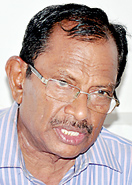
Professor Balasundarampillai | "The young people are very few in Jaffna. The young men have died or gone away. You see young girls everywhere usually, no?"
But an equally strong reason for favouring Mr Wigneswaran was that his sons had married Sinhalese, his grandchildren were half-Sinhalese, and he would be a bridge between Sinhalese and Tamils. This desire for clasping hands across a communal abyss seems to be a wish not strongly articulated by the TNA old guard.
The students were not satisfied that the military needed all the 6500-odd acres it had commandeered for its High Security Zone, even for the enlarging of Palaly Airport and Kankesanthurai harbour. But “the army can take the coastal land”, they said. Again, not the zero sum demand of the politicians.
The reason the students gave for wanting land powers under a 13th Amendment were less to do with Tamil nationalist aspirations but out of muddled thinking that a provincial government with land powers could force the national army to surrender the 6500 acres.
The reason given for wanting police powers was simply because the appointment of Tamils as police officers in Jaffna would make it easier for Tamil-speaking residents to explain and lay complaints in police stations – a wish the UPFA central government could gratify by recruiting more Tamil police without bringing in the amendment Defence Secretary Gotabaya Rajapaksa categorically does not want.
More than anything else, the young men and women wanted jobs. They would go to any part of Sri Lanka if offered a job. Every male student and most females asserted without hesitation that they would go overseas for work if offered the slightest chance.
“There are no opportunities in Jaffna for us,” one student, Janani said, “and food prices are very high.” That Jaffna would lose the intellectual capital of this generation is a disaster. A 52-year-old mother attending the UPFA campaign launch last week summed up the situation for many. “I don’t know anything about politics,” she said. “Three of my children are unemployed. My daughter was given a job in the hospital and that’s why I support the ruling party. There are six votes in my family. All six votes will go to the ruling party.” Two young men sitting nearby were also there because they wanted jobs.
Contested land – and money
At the end of one of Jaffna’s smooth-as-silk new roads – main, secondary and even some tertiary roads have been widened and neatly macadamised – lies Maviddapuram Kovil, a site of religious observance for 3,000 years. Arch-rivals in politics, TNA MP Mavai Senathirajah and the UPFA’s probable nominee for provincial chief minister, Ankajan Ramanathan, both worship here.
A few metres beyond it is the checkpoint for the High Security Zone, the 6500 acres of army-held land. Across from the kovil, soldiers peer out from a guardpost on the road that leads to another famous landmark, Keerimalai temple.
Between these two temples the scrubland tells a story of changing realities after the war years and the first years of military saturation of the peninsula.
The borders of the militarised zone here have been slowly contracting to the current 6500 acres – one-fortieth of the Jaffna landmass. Reportedly the most heavily-mined zone in the peninsula and subject to heavy artillery barrage, there were no houses left standing on either side of Maviddapuram Road after the war ended in Jaffna in 1996, and jungle smothered the ruins.
Now, driving through to Keerimalai, there are signs of people moving back to the de-mined lands returned by the army. The scrub is being cleared for cultivation (a newspaper report last year said some settlers had asked the army to send bulldozers in to help) and small houses are going up.
The Sunday Times spoke to four men who had come to the evening pooja at Maviddapuram – Senduran, Ganesh Das, K. Kanthareuben and Wylaman Ganesh. All had been displaced during the war and had come back around 2011 when their lands had been released by the military.
The miseries of displacement persist. Ganesh Das, who is still to rebuild his house, has not met anyone he knew from the old days. “Everyone is in Colombo right now.” He wants a job.
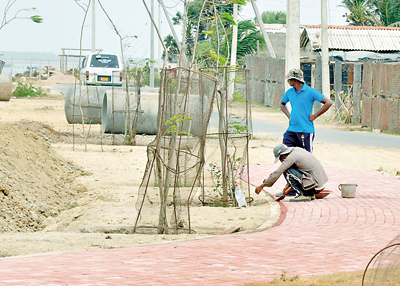
Reconstruction work around the Jaffna Fort area
Wylaman Ganesh, who was displaced in 1990, moved to Chunnakam, then Matale, before returning home in 2011. “I was heartbroken when I saw my home and the other buildings broken,” he said. The army had helped him to repair his house. Senduran, who had worked in Saudi Arabia and the UK during his years of displacement, also said the army had helped him to clear his land and start rebuilding.
Twenty-nine-year-old K. Kanthareuben is overjoyed to be back on land that is in his soul. “If a person dies it’s tradition to bury them where they were born,” he said. “I am so pleased to be back.
My mother, who is very old, said, ‘Son, please bury me here, this is where I want to be’, and I will do that.” Kanthareuben was devastated when he saw his house in ruins, with trees growing through the walls. He has built a new small house and has re-started his life in Maviddapuram by opening a small kade. “I can stay open until midnight without worrying about security because the army guardpost is near the shop,” he said. “People in the area go round feeling safe with the army there.”
The army is also preparing to help rebuild the main entrance to the Maviddapuram Kovil, and among its other tasks last week was to send soldiers scouting for 1000 lotuses for the Keerimalai Kovil at the chief priest’s request.
The story fed regularly to the media about compensation for the 6500 acres acquired in this area indicate there is unbroken public resistance to the army offer of compensation and even that the question of compensation is a con. At Jaffna University, Professor Balasundaram tap-danced over whether compensation had ever been offered, paid or accepted and said people were holding out for the return of their land. A combined court case has been lodged on behalf of land-holders wanting their land.
At Maviddapuram, we spoke to 23-year-old Swami Gnanaskandan Sharma, assistant priest at the kovil, whose father is chief priest and temple governing authority and whose ancestors have been chief priests there for 1300 years. Though young, authority sits plainly on Swami Gnanaskandan’s slight shoulders, and people come at once when he beckons with a long finger and a flash of a smile. Born in Malaysia and trained in IT in India, he would rather be in India still but accepts the call of ancestral duty.
“We are running a small government here,” he says, referring to the issues brought to the chief priest by the local people that must be resolved by negotiation with the different authorities including the army. One of the main issues is expropriated land.
“Senior citizens are the ones who want to come back,” he said. “They want to live their final days here where they were born. But youngsters who left at the age of five or so and who are now aged 30 or more – they would like compensation for their land.”
Many of them are abroad. “They keep calling and asking for compensation to be arranged because they want to give the compensation to their relatives here,” said Swami Gnanaskandan.
He knows of about 50 people who have sought and received compensation for their lands in the High Security Zone. Obtaining either land or compensation is not straightforward: one difficulty is to establish who the rightful owner is. Swami Gnanaskandan said difficulties often arose because “some people are misdirected to the wrong department, not the Ministry of Defence”. They were misdirected by politicians.
Swami Gnanaskandan says the elections will be vital. “It is a must,” he said. “A provincial council will think in a different way from the current Government Agent, who is responsible to the central government. We need change. Displaced people need a great deal of help.”
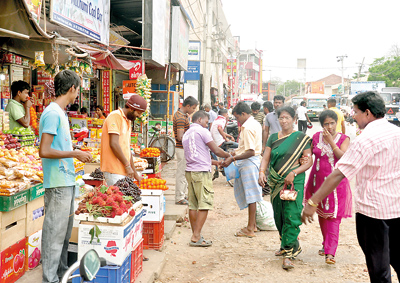
The hustle and bustle of Jaffna town
“People like to have an elected provincial government,” says Professor Balasundarampillai, elected, not selected.”
Jaffna was sick of being governed by remote control from Colombo through the central government and even by Tamil MPs who only visited Jaffna but lived elsewhere. “Jaffna wants to be governed by leaders who live here,” he said.
Enter Daya Master
In the Alice-in-Wonderland of Jaffna politics where politicians and former terrorist leaders vie for the mantle of people’s champion, the former spokesman of the Tigers, who has joined the ruling party’s ticket, insists on campaigning under his former nom de guerre.
Asked whether he wanted now to be addressed by citizens by his real name of Velayuthan Dayanithi, he briskly shakes his head. “They know me as Daya Master,” he said. The UPFA asked him to be a candidate because “the people know me here”.
So a man who belonged to the LTTE will be standing against the TNA, which once backed the LTTE as the sole legitimate voice of Tamil aspirations. Daya Master’s next court appearance over possible terrorism charges is in November or December – “The UPFA told me that if I am not convicted I can remain as a candidate”.
He smiles a little when the TNA’s anointing of Mr Wigneswaran is mentioned. “They have brought into the party a new man,” he says, “a Colombo man.” The change was because the TNA wanted someone flexible, not absolutist, unlike others on the TNA list “who are not going to solve any problem”. It is widely known that Mr Senathirajah wanted the position.
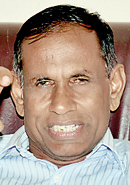
Daya Master | “Politicians here talk negatively, not positively. That is one of the reasons why the young people are fed up with politics. So we are unable to get ahead. And that is why our people are going abroad. We must change this.”
The former LTTE official condemned the hold of LTTE-leaning TNA members on Jaffna University, saying its “negative” thinking was obvious over an academic boycott of a June conference on the role of peace education organised by the university and the University Grants Commission. A triumphant news item on Tamilnet notes: “Jaffna University Teachers’ Association boycotted a ‘national’ level conference on the “Role of Higher Education in Reconciliation” hosted in Jaffna last week by genocidal Sri Lanka’s University Grants Commission …. Fearing the prevailing mood at the university, the conference was held almost as a closed-door affair at a hotel in Jaffna.”
“Politicians here talk negatively, not positively,” he said. “That is one of the reasons why the young people are fed up with politics. So we are unable to get ahead. And that is why our people are going abroad. We must change this.”
Beyond development
Jaffna’s recovery from its war wounds is growing apace. Apart from the amazing new network of roads (Colombo is a poor cousin by comparison) more than 90 per cent of the population is connected to the national grid, and there are new buildings going up everywhere. Compared to the devastation that stretched from horizon to horizon in early 2000 there are very few shell-marked buildings – fewer even than a year ago and almost none to be seen from the main road because of the rebuilding. Tutories and IT colleges thickly sprinkle the streets.
There has been a lot of money sloshing around Jaffna, remitted by Tamils who had gone abroad. The remittances are declining because these overseas Tamils are ageing and need the money themselves, and on visits they see the improvements in Jaffna. “They come here and see and say, ‘We are working in supermarket checkouts but here they are living a comfortable life. Don’t send!’” said Professor Balasundarampillai. “Madam,” said the old chief priest of Keerimalai Kovil, where a nine-storey new temple is being built with millions of rupees sent from the Tamil diaspora, “now Jaffna is like Colombo. Look at our roads – we are all flying!”
It’s not a wonderful life for everyone, though. Former combatants need targeted help to get on their feet financially and psychologically. Untrained for anything except carrying a gun, many are finding it hard to find work if they do not have family businesses to shelter them. There was an eager take-up of the low-interest loans offered to them but many did not know how to handle the money and ran into debt. Some are committing suicide, said Professor Balasundarampillai.
Beyond employment, beyond infrastructure development and Tamil rights, whichever party wins has a bounden duty to care for the social capital of Jaffna. The trauma of war and displacement bleeds under the skin, even with those who have found security abroad.
A note in our guesthouse Visitors’ Book reads: “I came back to Jaffna from the UK after 32 years with my brother-in-law who lives in France. I went to my native Kayts after a long time but came back to Jaffna with sad feeling because I could not find one single person with whom I could relate my childhood.”
Additional reporting by Skandha Gunasekera, Parameswaran Navaratnam
Follow @timesonlinelk
comments powered by Disqus

